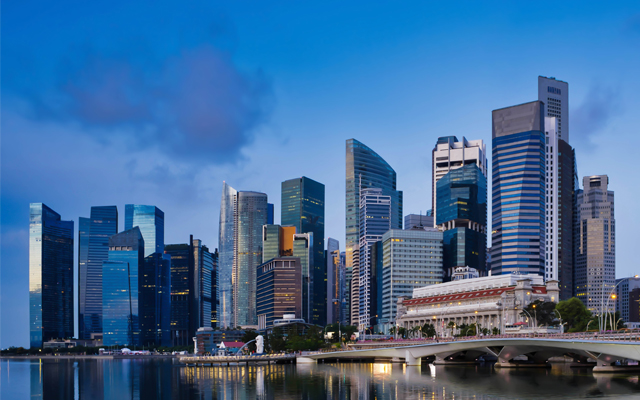There is a setback in Singapore’s journey towards business events recovery due to a new wave of infections, but her tourism board is pressing on with efforts to bring the industry back to life through digital transformation and pilot B2B hybrid events. By Rachel AJ Lee.
For the past year or so, Singapore was perched on the brink of business events recovery, with the successful staging of several large-scale hybrid events and the launch of the Connect@Singapore controlled inbound and meetings initiative.
Improved pandemic controls allowed community restrictions to be cautiously lifted, individuals to return to their workplaces, business meetings to be conducted under Safe Management Measures (SMMs), and new event wins to be celebrated, such as the inaugural Global Esports Games scheduled for December 2021.

However, at press time in late-May, Singapore stepped back into a partial lockdown due to a spike in community cases, including unlinked infections. The current Phase 2: Heightened Alert restrictions differ from last year’s tough lockdown, as business events are still allowed to proceed but with capacity reduced to 100. Pre-event testing is also compulsory for meetings with more than 50 people.
The precarious state led several high profile international meetings to either cancel or postpone their upcoming plans in Singapore. These impacted events include the World Economic Forum and the Shangri-La Dialogue, both of which have been cancelled; and the 7th Architecture & Building Services 2021, which has been moved from June to November.
Large-scale hybrid events on trial
Despite the setback, Singapore Tourism Board (STB) is persisting with phased reopening of the country’s business events industry.
Edward Koh, STB’s executive director, conventions, meetings & incentive travel, said the “calibrated manner” of reopening will “prevent new clusters from forming and reduce transmission risk”.
The careful stance taken by STB includes “rigorous protocols and innovative solutions for the end-to-end visitor journey”, with measures constantly reviewed and enhanced through various pilot events, such as TravelRevive in 2020 and Geo Connect Asia 2021. Findings and data from these events are helping STB to refine SMMs and best practices for future events.
For example, meeting pods, which enabled one-to-one meetings between exhibitors, representatives and attendees during TravelRevive in November 2020, were well-received. Larger pods were then piloted at Geo Connect Asia 2021. These were double in size to facilitate more productive discussions among four people, with two representatives from each company.
He pointed out that the resumption of more business events depends on the success of the pilot events, and the ability and readiness of event owners and organisers to apply SMMs effectively. These SMMs have to span an attendee’s entire journey, before, during and after the event.
“We will also continue to actively work with stakeholders and the Singapore Association of Convention and Exhibition Organisers and Suppliers, to develop robust SMMs and best practices to guide the industry and support a successful recovery,” said Koh.
Helping hands
Besides laying the groundwork for the safe resumption of business events, STB also facilitates events take-off with grants through the Business Events in Singapore scheme and extra support services through the Singapore MICE Advantage Programme.
While Koh said tourism revenue will inevitably shrink this year, the “fundamentals that make Singapore a key MICE hub and attractive location for business and leisure events remain unchanged”. This will put Singapore in a “good position” to emerge stronger after the pandemic ends.
Another positive step is the national vaccination programme, where the government’s target is to vaccinate the local population by end-2021.
Meanwhile, Koh pointed out that digital transformation is extremely crucial for the industry, and that includes hybrid events that have become the norm.
To support businesses in their digital journey, STB’s Business Improvement Fund will help business event owners pivot, upskill and build up technology capabilities. The fund encourages technology innovation and adoption, as well as the redesign of business model and processes in the tourism sector to improve productivity and competitiveness.
William Lim, director of operations, MICE Depot, told TTGmice that his company has benefitted from the Business Improvement Fund. “It accelerated our digital technology adoption and development of our digital solutions. It supported the development of immersive digital experiences for our customers. We will continue to embrace change and stay flexible to evolve quickly in this rapidly changing environment and will continue to adopt new technologies to address our customers and attendees’ needs,” detailed Lim.
However, STB’s focus on the digitalisation of the business events industry has met with disapproval from Kenny Yong, founder and group CEO of Fireworks Trade Media.
Yong pointed out that not every event organiser benefits from digitalisation and the shift to hybrid online/in-person events.
“Every bonafide organiser knows that you can’t monetise digital expos as much as you can from a physical event,” Yong remarked.
“I think STB could do more to map out ways to allow more attendees (at in-person events) and (have) more certainty in rules and regulations pertaining to shows. We are facing massive challenges (in informing) our exhibitors that footfalls would be limited in compliance with local laws and (that we are) not certain when shows could be staged. (This is) detrimental to shows in 2020 and 2021.”











